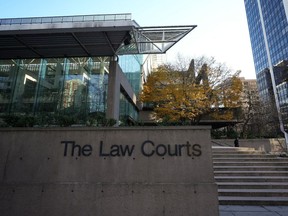Her mother alleges they were treated differently than non-Indigenous people, according to claim in B.C. Supreme Court

An Indigenous woman left with severe disabilities at birth is suing two Northern B.C. hospitals owned by the United Church. The lawsuit alleges negligence for her injuries and that she received “substandard” care because of her race in violation of her Charter rights.
The hospitals have denied any wrongdoing and said the lawsuit isn’t the right forum for a discrimination claim, according to their filed response to the B.C. Supreme Court lawsuit.
The claim was filed by Ashbee Apperloo, 20, of Burnaby, and her mother, Allison Wale, against the United Church of Canada, the Northern Health Authority, Wrinch Memorial Hospital in Hazelton, Mills Memorial Hospital in Terrace and three doctors who delivered Apperloo in 2004.
“The defendants did not react in the same manner they would have to a similarly situated plaintiff who was not an Indigenous person,” it said.
The lawsuit alleges the “substandard medical care constitutes discrimination based on the mother and (Apperloo’s) race and ethnic origin,” contrary to the Canadian Charter of Rights and Freedoms, which guarantees equality regardless of race.
Their lawyer, Nathan McQuarrie, said it was contradictory for the health-care sector and the province to acknowledge harms done to Indigenous Peoples, as the Canadian Medical Association did on Sept. 18 during a ceremony in Victoria.
The statement in part said, “Racism and negative stereotypes of Indigenous peoples continue to impact the quality of care that medical professionals provide” to them.
“I know they have to defend against lawsuits,” McQuarrie said of the provincial health authorities and hospitals, “but it’s interesting that they should deny (the allegations).”
He said in an emailed statement that it’s “concerning when these institutions face direct legal claims related to the very wrongs they have apologized for, they deny any wrongdoing.”
McQuarrie said the lawsuit’s aim is to address the “significant harm” done to Ashbee, her family and Indigenous communities, and to raise awareness about systemic racism.
The lawsuit alleges a profound lack of oxygen to Apperloo’s brain during delivery because of a series of delays left her with significant cerebral palsy and intellectual and developmental deficiencies. She will be dependent on medical and other assistance for the rest of her life, will never be “competitively employable” and will have lifelong medical and other expenses to allow her to live with her injuries, it said.
After Apperloo was delivered, Wale was left to care for her alone despite the baby being visibly blue from lack of oxygen, the lawsuit said. It details that and other instances during her hospital stays that it says led to her injuries.
The lawsuit alleges that the United Church’s hospital services division and the Northern Health Authority were negligent in their “hiring and supervision practices” because they failed to oversee the health-care providers responsible for Apperloo’s prenatal care and delivery.
The lawsuit is seeking damages for Apperloo’s permanent disabilities and all costs associated with that, her loss of opportunity, compensation for loss of culture and of earning capacity, future care costs, punitive and aggravated damages. And Wale is seeking out of pocket expenses for her daughter’s care, loss of past wages because of her inability to work while caring for her, and other damages, it said.
In their response, the defendants denied the allegations.
“The protocols, policies, systems, procedures and standards at (the hospitals) were reasonable, proper and in accordance with the applicable standard of care” and the defendants deny any of their employees were negligent in their care of Wale and Apperloo, the response said.
As for the Charter challenge, the defendants also say the Charter doesn’t apply because none of the hospital defendants are “government” within meaning of the Charter.
None of the allegations have been proven in court.